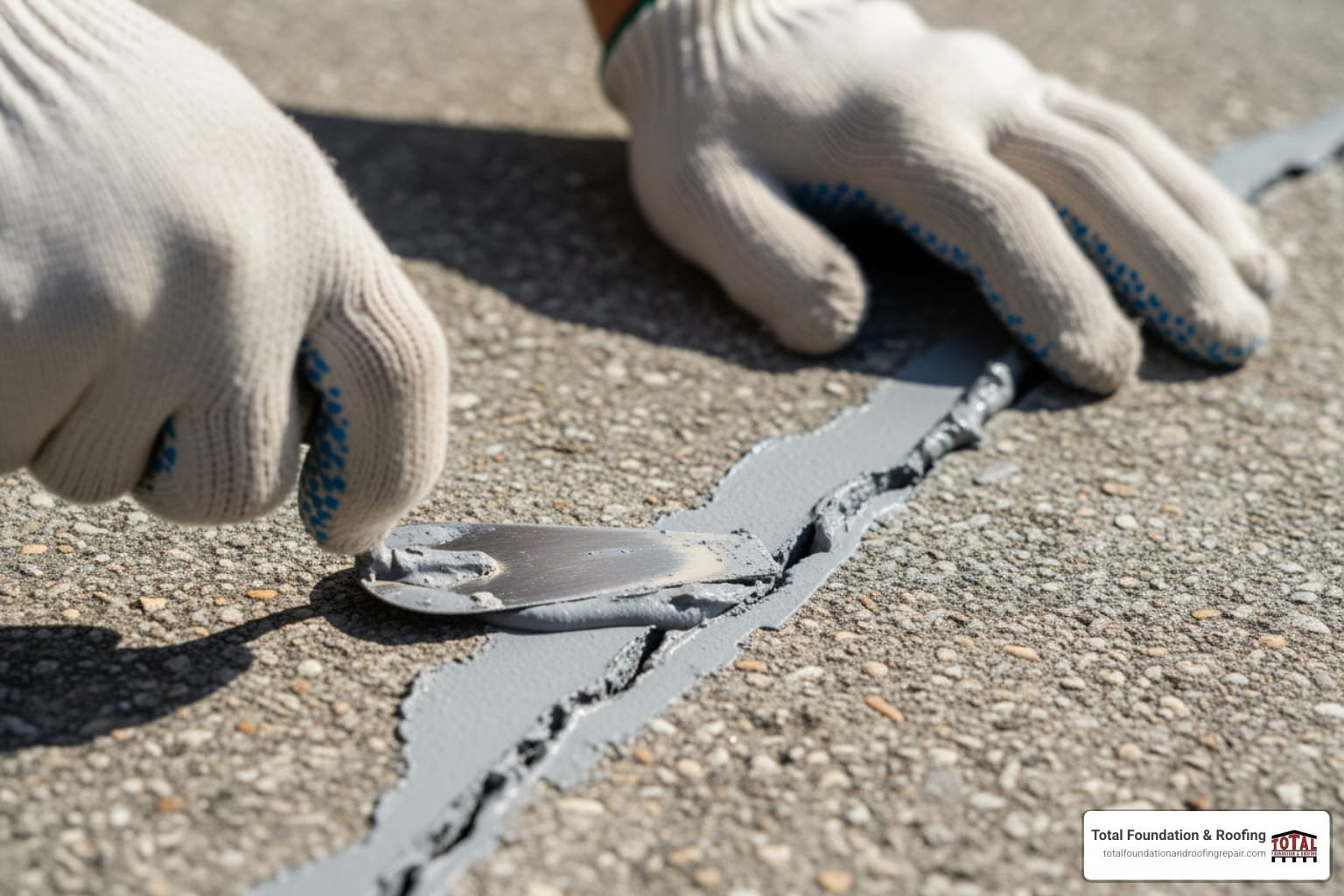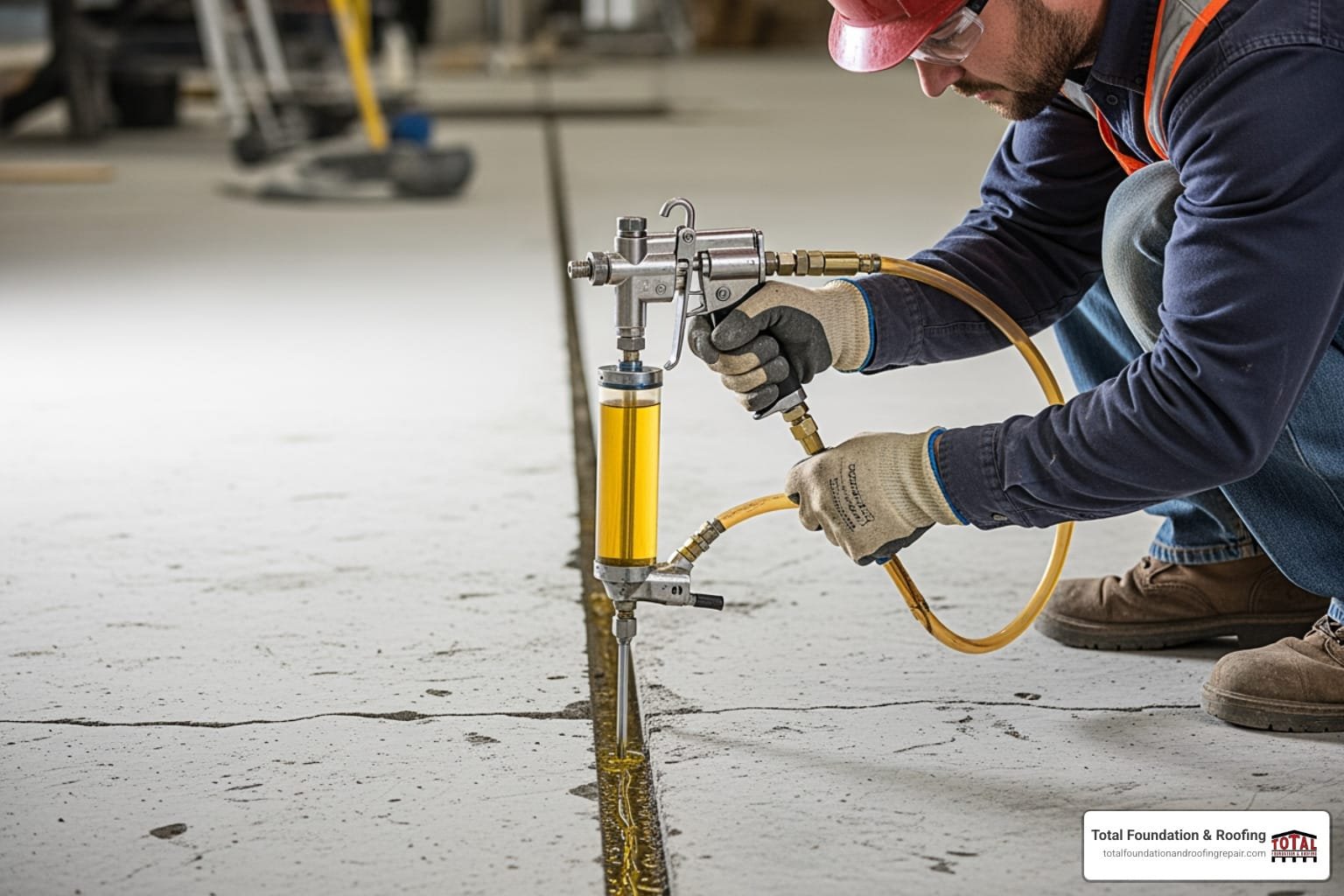Table of Contents
ToggleProtecting Your Commercial Investment
Water damage is one of the most expensive problems commercial property owners face. A building’s first line of defense against moisture is its foundation. For commercial property owners, ensuring this defense is impenetrable is crucial, and partnering with expert foundation and roofing professionals is the first step toward protecting your investment. The right team prevents costly water damage, mold, and structural decay.
Waterproofing contractors are specialized professionals who install systems to prevent water from penetrating your building. Their essential services include:
- Foundation and basement waterproofing
- Commercial caulking and sealants
- Facade restoration and protection
- Parking garage deck coatings
- Below-grade waterproofing systems
Professional waterproofing contractors bring specialized knowledge of building envelope science, local soil conditions, and proven materials that DIY solutions cannot match. As Daniel Sowell, owner of Total Foundation & Roofing with over 18 years of construction experience in the Texas Hill Country, I’ve seen how proper waterproofing prevents costly foundation issues. Working with qualified contractors who understand regional challenges like expansive clay soils is essential for long-term building protection.
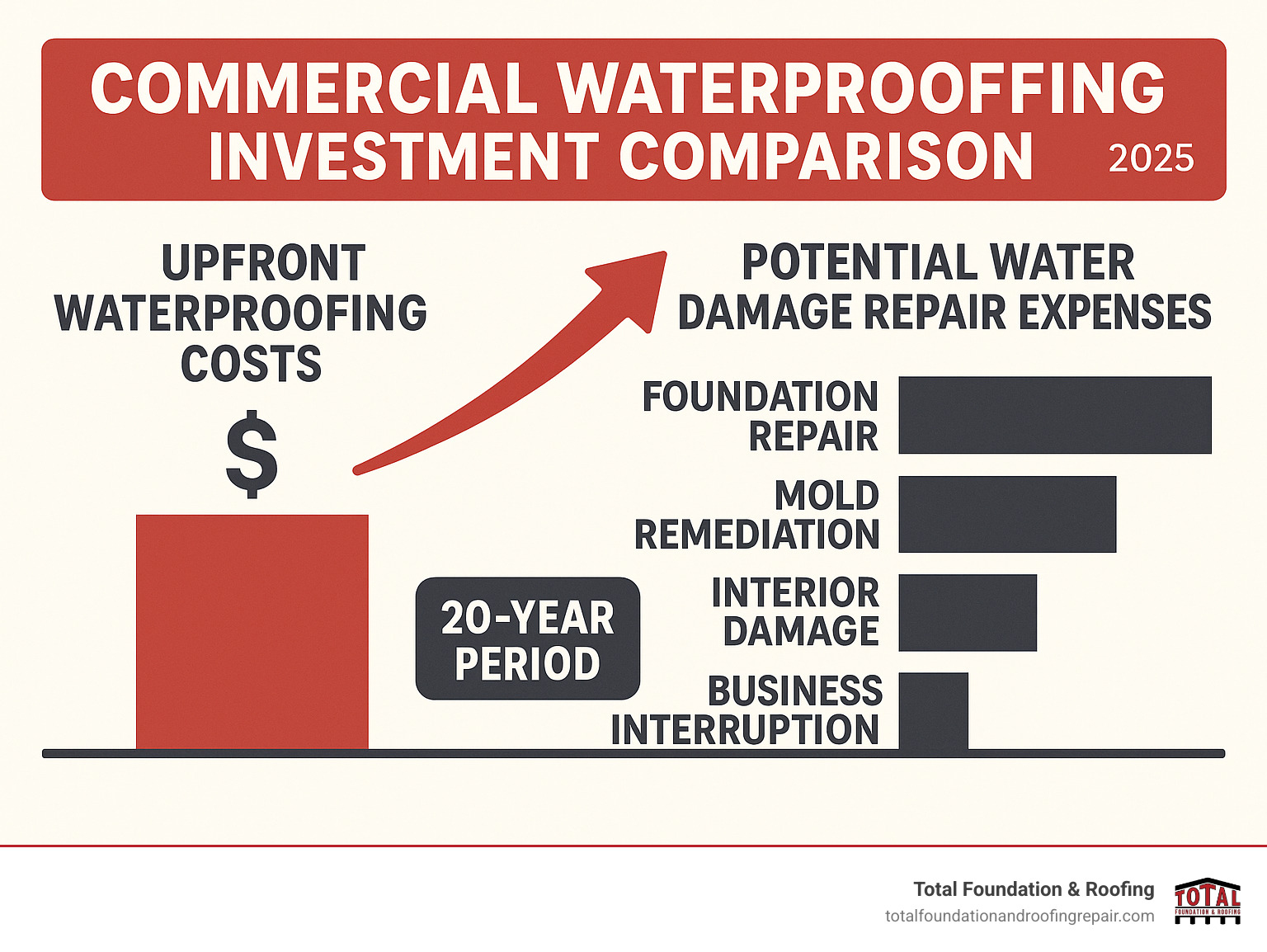
Basic waterproofing contractors terms:
What is a Waterproofing Contractor and What Do They Do?
Think of a waterproofing contractor as your building’s personal shield against water damage. These specialized professionals implement systems and materials to keep water out of your building’s structure, or “building envelope.” Their work goes far beyond fixing a leaky basement; they protect the entire structural integrity of your investment from foundation to facade, stopping moisture intrusion before it leads to costly damage, mold, or structural failure.
Scope of Services and Why Professional Application is Key
Commercial waterproofing isn’t a one-size-fits-all solution. Professional waterproofing contractors offer a range of services to protect every vulnerable area of your property:
- Below-grade and Foundation Waterproofing: This is the core of structural protection, involving barriers applied to foundation walls below ground level. These systems combat hydrostatic pressure—the force of water in the soil pushing against your foundation. Our team specializes in comprehensive Foundation Waterproofing Services designed for the challenging conditions of the Texas Hill Country.
- Facade Restoration: This involves repairing and waterproofing masonry, stucco, or other exterior materials to prevent water entry through walls.
- Commercial Caulking and Sealants: These seal joints, cracks, and penetrations, preventing water damage and improving energy efficiency.
- Parking Garage & Balcony Waterproofing: These areas require traffic-bearing membrane systems to protect the concrete structure from weather and chemicals.
- Elevator Pit Waterproofing: A critical service, as these below-grade areas are highly vulnerable to water that can damage expensive equipment and create safety hazards.
Attempting DIY solutions for commercial waterproofing is a significant risk. Professional waterproofing contractors bring expertise you can’t get from a hardware store. The industry, advanced by organizations like the Waterproofing Contractors Association since 1970, relies on material science, adherence to building codes, and specialized equipment. Most importantly, professional work comes with warranties, giving you peace of mind that the job is done right the first time.
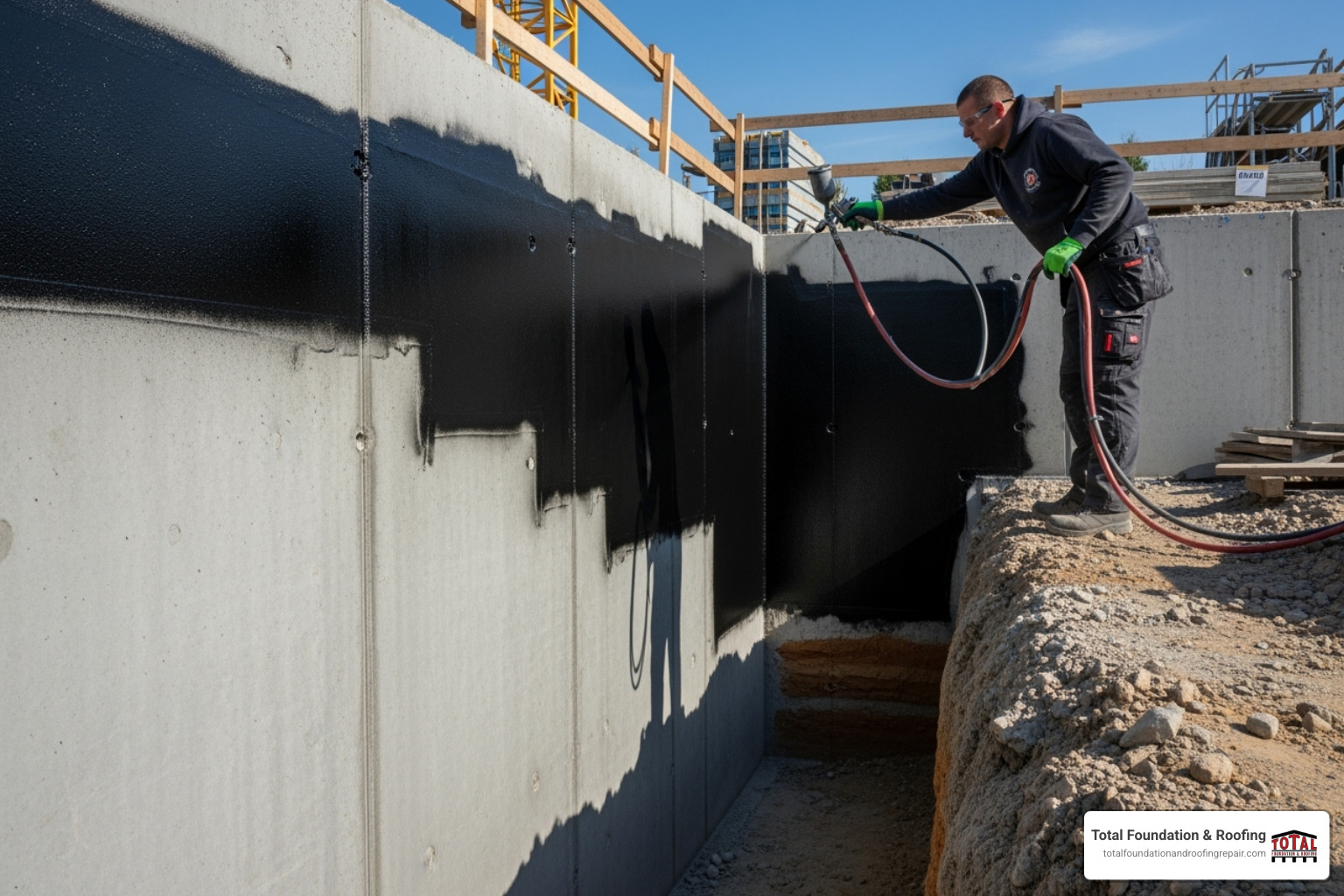
Key Benefits of Waterproofing Your Commercial Property
Proactively waterproofing your commercial building is one of the smartest investments you can make. It’s about safeguarding the structure and its value for years to come. For property managers, waterproofing contractors help protect tenant satisfaction, property value, and operational costs by creating a comprehensive moisture barrier.
Preserve Structural Integrity and Prevent Costly Repairs
Water is a silent and persistent destroyer of buildings. A dry foundation is a stable foundation, especially in the Texas Hill Country with its expansive clay soils. Professional waterproofing manages hydrostatic pressure and prevents:
- Foundation Cracks: Water-saturated soil shifts and expands, creating stress that cracks foundation walls.
- Concrete Spalling: Water seeps into concrete, freezes, and expands, causing the surface to chip and flake away, which is a sign of structural weakening.
- Rebar Corrosion: Moisture causes the steel reinforcement inside concrete to rust and expand, cracking the foundation from within.
- Mold and Mildew: Damp environments are breeding grounds for mold, which poses health risks and requires expensive remediation.
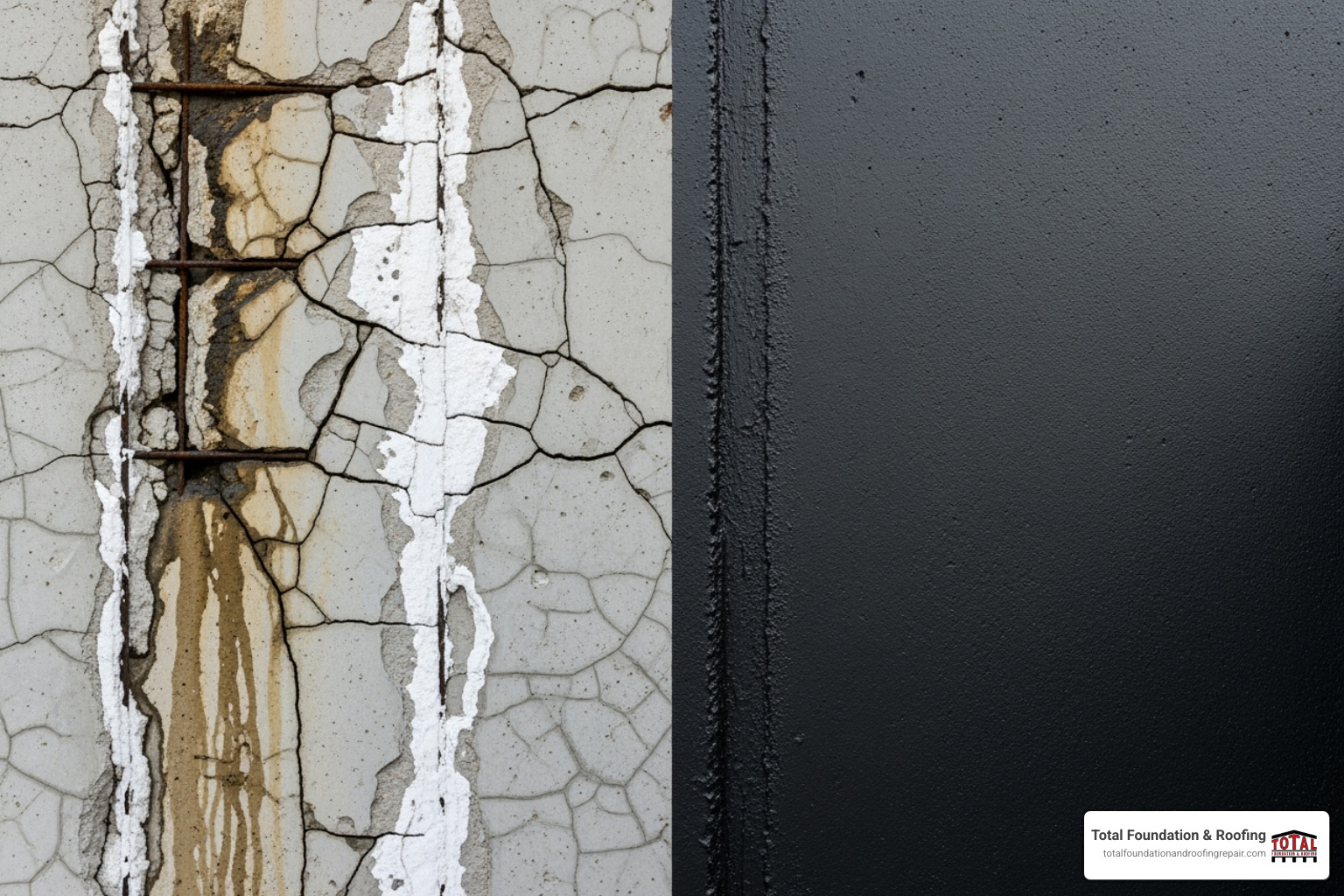
Improve Property Value and Appeal
A building free from dampness and musty odors is inherently more attractive to tenants, employees, and future buyers. It signals that the property is well-maintained and professionally managed.
- Healthier Indoor Environment: Preventing mold and mildew improves indoor air quality.
- Reduced Maintenance Costs: Proactive waterproofing means less money spent on reactive repairs like patching leaks or replacing damaged drywall and flooring.
- Increased Marketability: A protected property signals quality and foresight to prospective tenants and investors.
- Energy Efficiency: Dry walls maintain their insulation value, reducing HVAC workload and lowering utility bills.
Protect Interior Assets and Operations
For many businesses, the building’s contents are as valuable as the structure itself. Waterproofing provides critical protection for:
- Inventory and Equipment: Prevents catastrophic losses for retail, manufacturing, and storage operations by keeping goods and machinery safe from water damage.
- Business Continuity: Avoids temporary closures, operational halts, and revenue loss caused by flooding or water damage.
- Data Centers: Protects servers and sensitive electronics that require completely dry environments to function reliably.
A Guide to Modern Waterproofing Systems and Methods
The right waterproofing system depends on your building’s construction, local soil conditions, and the source of the water. Waterproofing contractors must evaluate these factors to choose the best approach. In the Texas Hill Country, understanding hydrostatic pressure—the force of water pushing against foundation walls—is crucial. Contractors may recommend positive-side waterproofing (exterior) to stop water at its source or negative-side waterproofing (interior) to manage it after entry.
Exterior Waterproofing Methods
Exterior waterproofing acts like a raincoat for your building, stopping water before it touches the foundation. While it’s often the most effective method, it typically requires excavation, making it more invasive and costly. Common exterior solutions include:
- Fluid-Applied Membranes: Liquid coatings that are sprayed or rolled onto foundation walls, curing to form a seamless, flexible barrier.
- Sheet Membranes: Pre-manufactured rolls of waterproof material, such as rubberized asphalt, that are adhered to foundation walls for robust protection.
- Bentonite Clay: A natural clay that swells when wet, creating a dense, impermeable barrier. It can be applied in sheets or as a slurry.
| Feature | Exterior Waterproofing | Interior Waterproofing |
|---|---|---|
| Pros | Stops water at the source; Most effective; Protects foundation from external elements | Less invasive; Often more affordable; Can be done year-round |
| Cons | Invasive (requires excavation); More expensive; Disruptive to landscaping/hardscaping | Manages water after it enters; Doesn’t stop structural damage from external water pressure; Reduces usable interior space |
| Typical Applications | New construction; Major foundation repairs; Severe hydrostatic pressure issues; Ideal for long-term, comprehensive protection | Existing basements where exterior excavation is impractical or too costly; Managing minor leaks or condensation; For situations where interior finishing is a priority |
Interior Water Management Systems
When exterior methods aren’t practical, interior systems offer an effective alternative. They manage and redirect any water that enters, keeping your lower level dry. These systems include:
- Interior Drainage Systems: Perforated pipes installed around the basement’s interior perimeter collect water and channel it to a sump pump.
- Sump Pumps: Devices that sit in a basin, collect water from the drainage system, and automatically pump it away from the foundation.
- Vapor Barriers & Dehumidifiers: Plastic sheeting (vapor barriers) and industrial-grade dehumidifiers work together to control moisture vapor and maintain low humidity, preventing condensation and mold.
Specialized Solutions for Cracks and Joints
Foundation cracks and construction joints are common water entry points that require targeted solutions.
- Crack Injection: Polyurethane grout is injected into active leaks, where it expands to create a flexible, waterproof seal. Epoxy injections are used for structural cracks to bond the concrete back together.
- Joint Sealants: Specialized, flexible sealants are used for expansion and control joints to maintain a waterproof seal while allowing for necessary structural movement.
How to Choose the Right Waterproofing Contractors for Your Project
Finding a reliable partner is the most important step in protecting your property. The right contractor brings skill, experience, and peace of mind. When searching for waterproofing contractors, look for professionals who understand your region’s unique challenges, such as the expansive clay soils and flash flooding potential in the Texas Hill Country. Partnering with experienced foundation and waterproofing specialists who know local conditions is essential for long-term protection.
What to Expect from Professional Waterproofing Contractors
A professional engagement should be systematic and transparent. The process includes:
- A Thorough Site Assessment: A detailed inspection to identify not just where water is entering, but why.
- A Detailed, Written Proposal: A clear breakdown of the recommended methods, materials, scope of work, and total cost.
- Clear Communication: Regular updates on progress and any unexpected issues.
- A Realistic Project Timeline: A schedule that accounts for potential disruptions to your business.
- Thorough Cleanup: Leaving your property in better condition than they found it.

Key Questions to Ask Potential Waterproofing Contractors
Don’t be shy about vetting potential contractors. The right ones will welcome your questions.
- How many years have you been in business?
- Can you provide references for similar commercial projects?
- What warranties do you offer, and what do they cover?
- Are you licensed and insured?
- What methods and materials do you recommend for my property, and why?
- How do you handle unforeseen issues and communicate changes?
Checking Credentials and Reputation
Before signing a contract, do your homework. A little research can save you major headaches.
- Check the Better Business Bureau for their rating and complaint history.
- Read online reviews across multiple platforms to gauge the customer experience.
- Look for industry certifications and professional memberships, which show a commitment to best practices.
- Ask to see their portfolio of completed commercial projects to get a visual sense of their work quality.
The lowest bid isn’t always the best value. Focus on finding waterproofing contractors who offer the right combination of experience, reputation, and fair pricing.
Frequently Asked Questions about Commercial Waterproofing
After years of working with commercial buildings across the Texas Hill Country, we’ve found property owners often have the same key questions. Here are the answers that matter most to your investment.
How much does commercial waterproofing cost?
The cost of commercial waterproofing varies widely. There is no single price, as the final cost depends on several factors:
- Property Size: Larger buildings require more labor and materials.
- Chosen Method: Exterior excavation is typically more expensive than installing an interior drainage system.
- Extent of Damage: Pre-existing issues like foundation cracks or structural damage will add to the project cost.
- Accessibility: Difficult-to-reach areas may increase labor costs.
- Regional Labor Rates: Costs reflect local market conditions.
Always get multiple, detailed estimates from qualified waterproofing contractors to compare not just the price, but the value and scope of the proposed work.
Does property insurance cover basement waterproofing?
Generally, standard property insurance does not cover waterproofing as a preventative measure. Insurance companies view it as the property owner’s responsibility, similar to routine maintenance. Most policies only cover “sudden and accidental” water damage, like a burst pipe, not gradual seepage or issues from deferred maintenance.
However, waterproofing is a key part of risk management. While the installation may not be covered, it protects you from much larger, non-covered damages down the road. Review your specific commercial policy with your insurance agent to understand your coverage for different types of water damage.
Is it better to waterproof from the inside or outside?
This is a common and important question. The best approach depends entirely on your building, budget, and the specific water problem.
Exterior Waterproofing is often considered the most effective method because it creates a barrier that stops water from ever touching the foundation. It addresses the problem at its source. However, it is more invasive and costly due to the required excavation, which can disrupt landscaping and operations.
Interior Water Management is a highly effective and less disruptive alternative. Instead of stopping water outside, it collects and redirects any moisture that enters, keeping the interior dry. This is often the practical choice for existing buildings where excavation is not feasible.
A qualified contractor will assess your property and recommend the best approach, which may even be a hybrid solution combining both methods.
Conclusion: Secure Your Foundation for a Drier Future
Protecting your commercial property from water intrusion is one of an owner’s most critical responsibilities. Waterproofing contractors provide comprehensive moisture management solutions that protect your structural integrity, preserve property value, and safeguard your business operations. The key takeaway is to be proactive—it is always more cost-effective than reacting to a disaster.
For property owners in the Texas Hill Country, our unique expansive clay soils and intense storms make professional waterproofing even more critical. These are not problems for generic solutions or inexperienced contractors. Partnering with a local expert who understands our regional conditions is essential.
At Total Foundation & Roofing, we specialize in protecting commercial properties against the specific challenges our climate poses. We know which materials and methods provide the most reliable, long-term protection for foundations in our area.
Your commercial property deserves professional protection. Don’t gamble with DIY fixes or cut-rate services when your investment is on the line. Take the first step toward securing your building by scheduling a consultation for your commercial foundation waterproofing needs today. A dry building is a valuable building, and that’s an investment that pays for itself.


